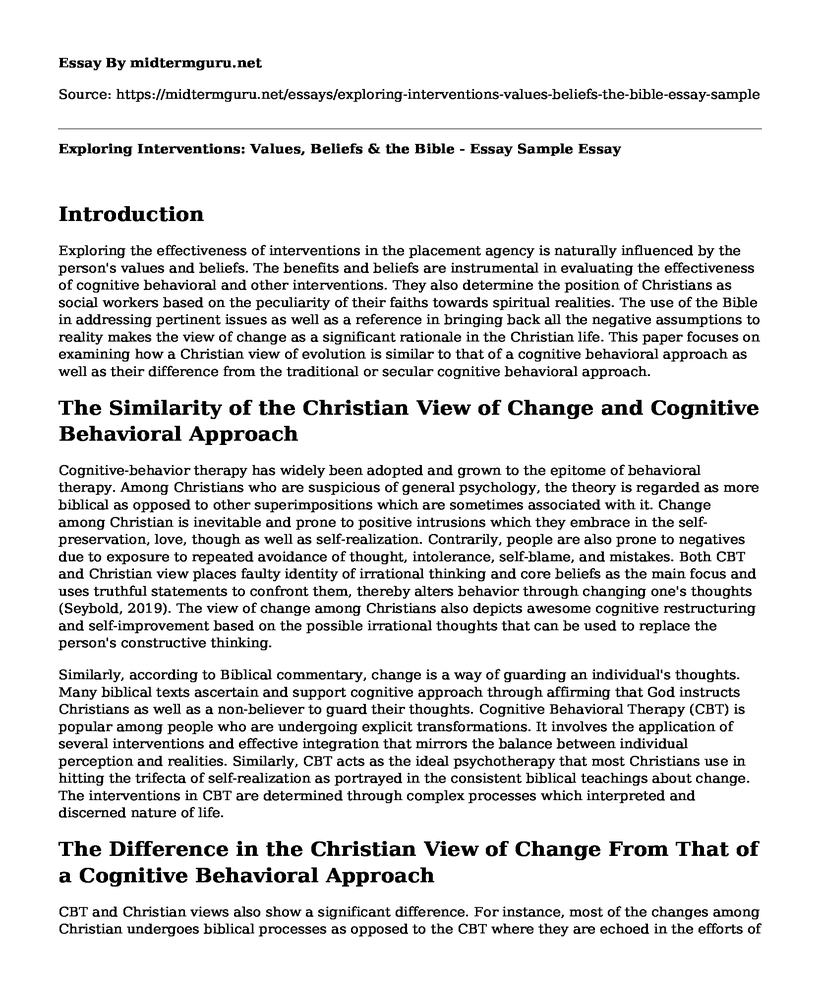Introduction
Exploring the effectiveness of interventions in the placement agency is naturally influenced by the person's values and beliefs. The benefits and beliefs are instrumental in evaluating the effectiveness of cognitive behavioral and other interventions. They also determine the position of Christians as social workers based on the peculiarity of their faiths towards spiritual realities. The use of the Bible in addressing pertinent issues as well as a reference in bringing back all the negative assumptions to reality makes the view of change as a significant rationale in the Christian life. This paper focuses on examining how a Christian view of evolution is similar to that of a cognitive behavioral approach as well as their difference from the traditional or secular cognitive behavioral approach.
The Similarity of the Christian View of Change and Cognitive Behavioral Approach
Cognitive-behavior therapy has widely been adopted and grown to the epitome of behavioral therapy. Among Christians who are suspicious of general psychology, the theory is regarded as more biblical as opposed to other superimpositions which are sometimes associated with it. Change among Christian is inevitable and prone to positive intrusions which they embrace in the self-preservation, love, though as well as self-realization. Contrarily, people are also prone to negatives due to exposure to repeated avoidance of thought, intolerance, self-blame, and mistakes. Both CBT and Christian view places faulty identity of irrational thinking and core beliefs as the main focus and uses truthful statements to confront them, thereby alters behavior through changing one's thoughts (Seybold, 2019). The view of change among Christians also depicts awesome cognitive restructuring and self-improvement based on the possible irrational thoughts that can be used to replace the person's constructive thinking.
Similarly, according to Biblical commentary, change is a way of guarding an individual's thoughts. Many biblical texts ascertain and support cognitive approach through affirming that God instructs Christians as well as a non-believer to guard their thoughts. Cognitive Behavioral Therapy (CBT) is popular among people who are undergoing explicit transformations. It involves the application of several interventions and effective integration that mirrors the balance between individual perception and realities. Similarly, CBT acts as the ideal psychotherapy that most Christians use in hitting the trifecta of self-realization as portrayed in the consistent biblical teachings about change. The interventions in CBT are determined through complex processes which interpreted and discerned nature of life.
The Difference in the Christian View of Change From That of a Cognitive Behavioral Approach
CBT and Christian views also show a significant difference. For instance, most of the changes among Christian undergoes biblical processes as opposed to the CBT where they are echoed in the efforts of therapists. According to an ancient behavioral therapist and ancient teachings, it is worth noting that a significant difference is looming in the integration processes which are adopted by in the biblical teachings in trying to create a holistic correlation.
Similarly, in CBT, the counselor can be used to affirm only issues which are helpful as opposed to biblical retractions, where the counselor confirms all true things. True statements in CBT are adversely utilized with little focus on combatting helpful automatic thoughts which are changing oriented (Seybold, 2019). The different connotation in the Christian view and the CBT shows that changes depend on the specific process. Overall, change in biblical process is a reminder of God's declaration of the truth in the universe.
Conclusion
In conclusion, faith in work as a social worker can be applied while dealing with people with different beliefs. The use of CBT is such occasions reduce complications in explaining the important issues which are pertinent in the person's life. However, an individual's faith and worldview usually shape the iterant perceptions that people usually have while interacting within their social settings. Overall, based on spiritual beliefs, CBT is the best intervention because it majorly addresses important issues that are pertinent in creating a holistic conclusion.
References
Depression: Christian Cognitive-Behavioral Therapy: https://www.youtube.com/watch?v=s8pN26kotwMSeybold, K. S., (2019). A Cultural Cognition Perspective on Religion Singularity: How Political Identity Influences Religious Affiliation. SOCIO-HISTORICAL EXAMINATION OF RELIGION AND MINISTRY: AJournal OF, 21.
Theological C B T Cognitive based Therapy - English Christian Sermon by Ray Bell: https://www.youtube.com/watch?v=iZZ-JU0C1wE
Cite this page
Exploring Interventions: Values, Beliefs & the Bible - Essay Sample. (2023, Jan 23). Retrieved from https://midtermguru.com/essays/exploring-interventions-values-beliefs-the-bible-essay-sample
If you are the original author of this essay and no longer wish to have it published on the midtermguru.com website, please click below to request its removal:
- Elements of Christian Worldview - Religion Paper Example
- Inspiration from The Past - Essay Sample
- Essay Sample on Negative Effects of Parental Depression on Dependent Children
- Organizational, Interpersonal, and Group Communication in Hospital - Essay Sample
- Article Analysis Essay on Shaping Agility Through Digital Options
- Infrastructure: Barrier to E-Commerce Growth & Development - Essay Sample
- Paper Example on Procrastination and its Solutions







